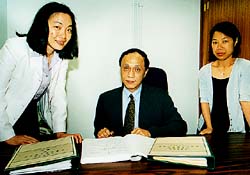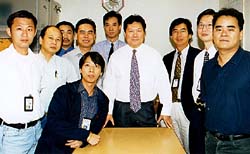



















 Character-building: CSP Gordon Yeung inspects the documents with working group members Senior Inspector Cicada Wong (left) and Percy Leung |
MORE
resources have been made available for expanding Chinese usage in the Force through the
availability of document templates on-line and resource centres in police stations.
The Working Group on the Greater Use of Chinese in the Force uploaded 128 templates containing commonly used documents, memos and glossaries on the Offiice Autonation NT Server last month with the assistance of the Official Languages Agency (OLA). The move allows Force staff to download the useful documents to use with their computer terminals. |
|
To assess the possible problems Force members might encounter with the use of Chinese, the Working Party conducted a six-month pilot scheme in Sham Shui Po Division and the Personnel Services Branch starting in July 1997. A Chinese Language Officer was designated to assist in drafting Chinese document samples, and frontline officers were requested to try out different types of Chinese word processing methods to help ITB determine which was best for Force staff to draft their own Chinese documents in future. It resulted in two sets of manuals being published which have been combined and uploaded. The complete manual is divided into three sections:
Part One:
Incorporated document templates of sample letters and correspondence commonly used in Sham Shui Po Division and Personnel Services Branch.
Part Two:
Consists of glossary terminology in both English and Chinese commonly used in the Force.
Part Three: N:\OLA\GONGAN.
Chief Superintendent of Service Quality Wing (Performance Review) Gordon Yeung Ying-wai said the scheme reflected the good work of the Force and the Government in promoting Chinese. Working group chairman and member of the Steering Group on the Greater Use of Chinese in the Force, Mr Yeung said the bodies were hoping to encourage greater use of Chinese through more materials and promotions. "And apart from producing a set of Chinese manuals with OLA, we are also studying the feasibility of promoting the use of Chinese with the assistance of Information Technology Branch (ITB)," Mr Yeung said. "With this, we have placed useful Chinese reference materials in the resource centres of three police stations so far, and hope with the completion of more resource centres, more Force members could make use of these materials." For enquiries, Force members can send an e-mail to ap1-ss45-a-itb@police.gov.hk, or call Jerry Lee at 2860-2837. |
|
A District Court judge has extolled an undercover Police Constable for his
work in an operation against a Wo Shing Wo triad gang.
Judge Gerard Muttrie commended the officer for the courage and time he spent on the undercover work, infiltrating the triad society and gathering evidence. The commendation came after Judge Muttrie meted-out sentences to 11 members of the gang on May 4. They were convicted as a result of the evidence gathered by the officer. |
 Triad taggers: CIP Ngan Chor-kwok (center) and his OCTB team |
|
The judge said he was also impressed by the officer's demeanour when giving evidence in court. It was the second commendation from District Court judges for undercover officers in two consecutive days. A day earlier, Judge Peter Line praised another undercover Police Constable for his efforts which resulted in the jailing of 22 members of the Wo Hop To triad. The undercover operation against Wo Shing Wo was initiated by the Organised Crime and Triad Bureau (OCTB) Team A in September 1997. The Chief Inspector of OCTB Team A, Ngan Chor-kwok, said the undercover officer, nicknamed "Little B", infiltrated Wo Shing Wo which was active in Yau Tsim District. "He managed to mix with a group of Wo Shing Wo triad members and was later invited to join," Mr Ngan said. After 10 months' investigation, the undercover officer collected sufficient evidence of crimes committed by the gang. "The OCTB, in July 1998, arrested 24 target persons, including a senior member of the Wo Shing Wo gang. "They were charged with a total of 44 counts of offences," Mr Ngan said. While some of them were tried in a magistracy, 11 were found guilty of various offences by the District Court. They included acting as a triad member, inviting a person to become a member of a triad society, claiming to be a member of a triad society, trafficking in and possession of dangerous drugs. Seven of them were jailed from nine months to two-and-a-half years while three others were sent to detention centres. | |
|
HERE are some examples of unwelcome remarks and unbecoming
behaviour towards members of the public while officers were discharging police duties.
An officer said to an old woman outside a temple: "There is no need to pray to God. Put out the joss stick!" When issuing a fixed penalty ticket, an officer said to the traffic offender: "Paying the fine is no big deal to you. You must have a lot of money driving a BMW." Asked for his service number, an uniformed police officer said: "look at my shoulder!" An officer stopped a man and asked what he was doing. The man said: "Just strolling around." The officer then said: "Why bother strolling around? You're being obnoxious!" An officer called a man "rubbish" when searching him. On another occasion, a man was called "Dai Luk Chai" (Mainlander). Asked why he was checking her Identity Card, an officer smiled in a flippant manner and said to the young lady: "Because you have fair complexion." |

